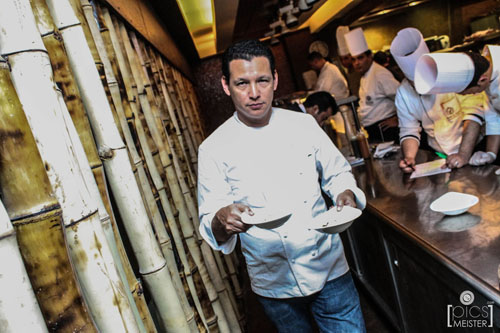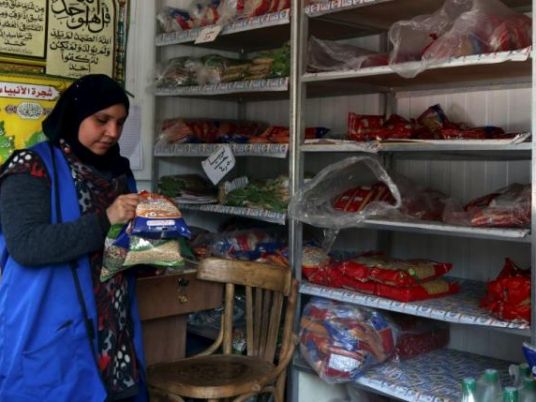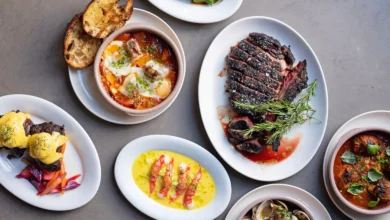
Celebrity chef Bobby Chinn — the popular Asian-fusion food entrepreneur, writer and TV personality — made his start redesigning Vietnamese dishes at his two world-renowned restaurants in Vietnam, but is adamantly averse to rethinking the taste and shape of his Egyptian mother’s family staple: fuul.
“For me, I would never mess with Egyptian food,” Chinn said in a recent interview at the Fairmont Nile City hotel while in Cairo on tour. “It’s like if you made something to perfection, if you hit it, leave it alone. I wouldn’t want to rearrange fuul. You know, what am I going to do different to fuul to make it better?”
He went on to add, “What would you do different to a falafel? Truffle oil? I don’t know what you’d want to do with it.”
It’s been a year since Chinn last came to Cairo to promote his newest food ventures. Since then, the price of basic foods in Egypt has been steadily rising — truffle oil included.
Chinn is a fast talker with a hint of middle-aged self-reflection. He is quick to both promote his many successes and food persona and to belittle the raw business practicalities driving the show.
“Chefs have egos,” he says. “And it’s a business.”
Speaking in English laden with Egyptian-accented Arabic phrases, Chinn regales the crowd around him with his seemingly never-ending trough of stories and one-liners that come sprinkled with recipes from his decades in the kitchen.
“I don’t think I do anything crazy,” Chinn says. “It’s knowledge. And it’s taste. And I think the more you eat, the more you understand food.”
Summing up the basics, he adds, “It’s taking cheap ingredients and making it expensive.”
Born in New Zealand to an Egyptian mother and a Chinese-American father, Chinn spent his childhood between the US, Cairo and London, where his grandfather was the Egyptian ambassador. He went on to receive a bachelor’s degree in economics and worked on Wall Street.
Quickly dissatisfied, he floated for several years between cities and jobs, including a stint in stand-up comedy in Los Angeles, before falling into the food industry.
After studying under prominent chefs in France and the US, Chinn moved to Vietnam in 1995. At the time, few foreign chefs had been exposed to Vietnamese cuisine just as Asian fusion started to become a worldwide food trend. Soon, Chinn was gaining recognition for creating dishes that mixed European techniques with Vietnamese ingredients.
“The food in Vietnam is uniquely different form the rest of Southeast Asian food,” Chinn says. “Vietnam is a country that has been fighting wars for thousands of years. They were fighting the French, they were fighting the Chinese, they were fighting the Americans, they were fighting the Chinese. … There became a cultural divide — the world doesn’t know anything about Vietnam except war.”
In Vietnam, Chinn found that customers both appreciated his creative mixings of European influences with Asian dishes — and were willing to pay the high price to keep his restaurants going.
Chinn says that the problem with “a lot of Asian fusion dishes is the fact that the chef can’t make the original dish.”
“When I have my Vietnamese staff eat my food, then my work is done because they can actually appreciate it,” he says. “And then you can make it a consistent product, because that’s what makes restaurants successful.”
Despite his ease experimenting with Vietnamese food, Chinn puts Egyptian cuisine in an entirely different category. When asked whether he would consider professionally experimenting with Egyptian cuisine — itself a mix of Turkish, North African, Middle Eastern and European influences — he categorically rejected the idea.
Describing Egyptian food as a comfort, he explained, “I’m opposed to taking my comfort food and turning it into some luxury fusion thing.”
Beyond the personal sentiments, Chinn emphasized that he saw no business potential to justify the high costs his kind of restaurants incur. After describing an elaborate and costly way he could cook fuul using various fusion techniques, he concluded that no one would pay US$15 for the dish — even if it came in a white ceramic bowl.
“It’s pointless for me to say, I’m going to go cook a new kind of Egyptian cuisine,” he said. “Then you guys don’t like it. Then it’s not good. You guys have to like it for it to be successful fusion.”
Facing an economic downturn and the rising cost of food, many of the main ingredients for restaurant success of Chinn’s echelon are indeed missing in Egypt.
In a city where a nice dinner out is associated with international cuisines at restaurants in hotels or areas like Zamalek and Maadi, Chinn’s remarks reflect a common claim that Egyptian cooks and their products cannot be classed up. Why, so the sentiment goes, pay to eat out what one’s mother makes best?
But perhaps there is a growing demand. Renowned Egyptian restaurants like Abou El Sid and Sequoia continue to find willing customers to pay their comparatively high prices.
In the last year, several restaurants have also opened, such as Cairo Kitchen and Zooba, whose subtle twists of the Egyptian standard coupled with moderate pricing have so far also proven popular and profitable.
Another interesting counter-trend is El-Set Ghalia, a post-revolution cooking show hosted by Ghalia Mahmoud, who cooks traditional Egyptian dishes in a typical kitchen in a show intended to provide visibility to the cooking needs of average housewives.
In a way, in these kitchens, the peoples’ chants of “Where is the bread?” has translated into a new kind of food trend: a renewed interest in de-marginalizing Egyptian cooking and cooks.
In contrast, Chinn recalls that growing up in a well-off family, he never felt that being a chef was something he could strive to be.
“No one’s a chef in our family,” he says. “You know, I never saw it as creative. I just saw it as everyday in our family.”
He peppers his words with Egyptian Arabic.
“It was like, if I’m in Egypt, ayz takul eih [what do you want to eat?] … And then you have that dish for, like, two or three days. It’s not like, haga gadeeda [a new thing],” he says. “And then if you do anything like haga gadeeda, it’s got to be la’ [no].”
Despite his now-stagnant relationship with Egyptian cuisine, Chinn still describes his Egyptian heritage as an important part of his brand.
Growing up in well-connected family, he also recalls having to learn to behave at tables grandly set with several sets of forks and spoons. He says his family didn’t like him eating from the streets.
Nevertheless, he tested his stomach.
“I remember eating mokh [brain] once,” he recalls. “Then they were kind of shocked that I could eat brain. I can eat anything. It’s the Chinese in me.”
Looking forward, Chinn says changing health, environmental and technological factors will be the major factors facing the celebrity food world.
“We are going to have to think about sustainability and about our diet,” Chinn says.
For celebrity chefs like himself, it is in these kinds of changing environments that their creativity — and customer and audience numbers — thrive.
“We are going to understand food like we never understood it before,” he adds. “We are going to break those barriers.”
Perhaps the next time Chinn comes to Cairo, he will also understand fuul in a new way, too.




